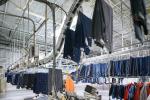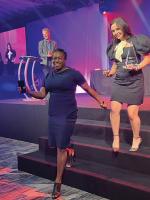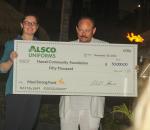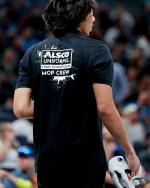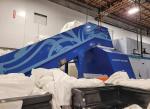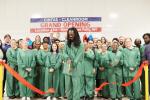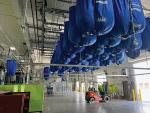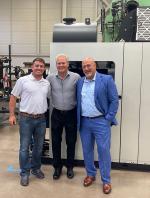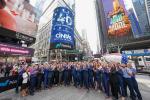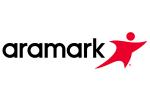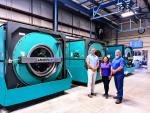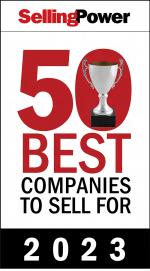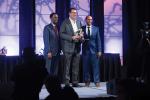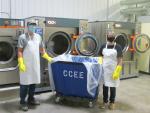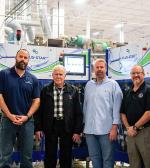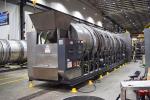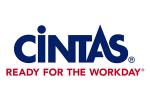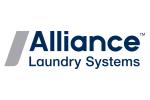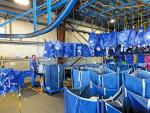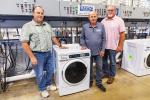CHICAGO — Hiring new employees has been difficult for the laundry and linen services industry for some time.
Even before the events of the past few years, operators were struggling to onboard key personnel such as plant employees, engineers and management.
“Like many industries, hiring remains a challenge,” says Jeff Peterson, sales manager at Spin Linen in Omaha, Nebraska. “We’ve had to re-evaluate everything from compensation to job duties, as well as get more innovative in our job postings to attempt to stand out.
“There doesn’t appear to be a magic bullet, so we are experimenting and tweaking our approach constantly.”
Fortunately, hiring in the industry is improving.
“There seems to be a positive shift lately,” shares Frank Maresca Jr., vice president of WW Uniforms in Wallingford, Connecticut. “The traction for getting new potential employees is increasing.
“The past has been an absolute struggle—from striking interest and applying to the open job to an employee accepting an interview or the position and the person doesn’t show up at all.
“Nevertheless, in recent months there has been an increase in applications and acceptance of the said available jobs.”
“We have started to see our labor pool open up a bit over the last couple quarters,” agrees Ben Warnecke, a fourth-generation family member and general manager at Plymate Inc. in Shelbyville, Indiana.
“Incenting and promoting our employee referral program has resulted in quite a few great hires for Plymate in recent years. We are laser-focused on onboarding and employee engagement once we make a hire, so, thankfully, we don’t find ourselves with more than a couple openings very often.”
Kleen Kraft Services in Commerce, California, has also had success with employee referrals onboarding qualified, dedicated workers.
“In general, we have very little turnover,” says Marilyn McCarty, marketing manager. “Many of our staff have been here for over 10 years and some as long as 40 years. I think this speaks to the type of operation that we run, the pay and benefits offered, and the feeling of belonging.
“Most of our new hires come in as referrals from current employees—drivers, sales reps, office staff—have all come in as referrals. With referrals like this, we can anticipate that the worker will be qualified and that they have a good idea of the work expected.”
While there are signs of improvement in the laundry labor market, many laundry operators still face difficulties.
“Hiring new employees remains a challenge for Paris,” says David Stern, president and CEO, Paris Companies in DuBois, Pennsylvania. “We are getting enough applications for most hires; however, the quality of the applicants has deteriorated from pre-pandemic.”
A major challenge is enticing younger employees to enter the laundry and linen services industry. Many don’t see it as a viable career option and aren’t prepared for the effort needed to succeed.
And some aren’t even aware that the laundry industry exists.
So, how can a laundry operator attract the next generation of laundry employees?
LAUNDRY OPERATOR INSIGHTS
Laundry operators agree with the insights Elissa Jessup, HR knowledge advisor for the Society for Human Resource Management (SHRM), shares about younger workers (Part 1), in general, when it comes to laundry and linen services attracting next-generation employees.
“In today’s environment, we must effectively convey the full package/opportunity to younger candidates when recruiting,” Warnecke points out.
“With an expectation of immediate gratification and plenty of options, we need to be able to map out a plan for possible upward mobility, promote the strong work-life balance we can offer, and focus on effective engagement and recognition once we have them onboarded to get the most out of each one.”
Maresca says, “The younger generation looks deeper into your company, not so much for what you offer on paper but for what others think of you—for scalability, company culture and opportunity for their resume.
“The work that our industry provides is not glamorous and requires leg work, lifting and early hours. Some of the major points we use are our involvement in green sustainability, community enrichment, four-day work weeks, great benefits, company outings, a relaxed family atmosphere, we have been in business for 99 years, and, of course, very competitive pay.”
“Younger folks have lived through some tribulations when it comes to the jobs,” Peterson shares. “They’re naturally not as inclined to trust employers, who they have seen treat people close to them as expendable. So, they’re a bit more jaded and cynical—perhaps rightfully so.
“Given that, you’ve really got to make an emotional appeal to them that they’ll be valued, treated with respect and part of a team. They like to belong to things that give them purpose, so appealing to the big picture and explaining the ‘why’ beyond simply telling them what their job duties are is one way to accomplish that.”
Stern agrees, “Younger employees’ expectations are different than past generations. They want upward mobility quicker without having to prove themselves.
“They have never seen a market where the employer has the leverage, so they know they have many alternatives, so a bird in the hand is not worth two in the bush.”
There are elements of the laundry industry that appeal to millennials and Gen Z, according to operators, along with methods to make a career in laundry more appealing.
“They like the technology piece, and most want interaction and recognition with and from other departments,” Warnecke shares.
“Cross-training is more important than ever not just to optimize our front-line labor but also to keep folks engaged and curious about other roles within our organization.”
“It seems that younger generations feel any position early on is more of a stepping stone until the next opportunity comes along,” says Maresca. “Older generations look for long-term positions, loyalty, benefits and the laundry’s long-term outlook.”
“The laundry industry isn’t as glamorous as many of the alternatives young people are exposed to,” Stern shares. “However, we noticed that young people are engaged in the fast pace and the different challenges that arise on a monthly basis and like the challenges of serving the customer on a just-in-time basis.”
Still, increasing the next generation’s interest in laundry operations will remain a challenge.
“By and large, they’re not getting into the laundry industry,” Peterson points out. “We need a talent infusion in a big way.
“As for the ones that are, I believe that they’re not inherently loyal, and sometimes that catches established, generational organizations (of which are very prevalent in this business) off-guard. Then, when they don’t stick around for 30 years, younger folks tend to get demonized for looking for greener pastures in more theoretically lucrative or more glamorous industries.
“Instead of treating such instances as a time for self-reflection, they’re made out to be scapegoats. And that becomes a vicious cycle because we need fresh perspectives.”
“Younger employees consider this a place to work just for the paycheck, not because they like this industry,” adds Rick Antman, director of operations for Kleen Kraft Services.
“They have more options than ever,” reminds Warnecke. “Some can find a structure where they aren’t expected to be ‘at work’ for the entire week and that’s what many of them want.”
Also, Maresca shares, it’s hard, dirty work on the floor.
“It’s early shifts and a lot of hard work,” Antman agrees. “Young people need a job where they can work and hold onto their cell phone with their other hand.”
Stern reiterates, “They don’t see the industry as glamorous, and, therefore, they don’t see the opportunities for themselves and their family.”
“It’s a systemic problem caused by a lot of ‘we’ve always done it this way’ coupled with an industry that, fundamentally, is actual rigorous, blue-collar traditional work,” adds Peterson. “The processing of textiles, the picking up of dirty laundry, etc., is not inherently sexy.
“But, on the flip side, a lot of young people who have come up staring at screens for years are looking for something ‘real’ and to get some dirt on their hands. Those are the ones we have to recruit and develop. There is a profile of talent that this industry can appeal to; it just needs to be presented correctly.”
And that means having a better understanding of how to reach younger employees, speaking to what they are looking for in a workplace.
Ed Heilman CEO of Ace Imagewear in Houston says the next generation is looking for purpose.
“I think as a society (in the United States), we’ve climbed the pyramid of Maslow’s hierarchy of needs and the current generation is looking for more than security (at least until they go hungry),” he shares. “They need to feel that their work is purpose-driven and has a good work-life balance.”
Warnecke adds that younger generations want interaction and recognition, balance and “fun.”
“Communication is key, and if there is upward mobility potential, creating a plan/roadmap for them early on can help keep them engaged and motivated,” he says.
“(They want) a community that values them as individuals but also assimilates them into a team framework with a communal purpose—a partnership,” says Peterson. “They’re not stupid.
“If they’re being exploited or taken advantage of, their opportunity for other careers is almost infinite in this labor climate. They know that and pretending otherwise as an employer is a dangerous game of chicken. Don’t assume that loyalty is a one-way street; these employees realize they don’t have to work for an employer that they don’t value.”
Stern adds, “Young people want quick advancement, shorter work weeks and like to work for a cause they believe in.”
Antman concludes, “They are looking for better pay with less manual labor.”
Check back Thursday for the conclusion about sharing the benefits of a laundry career. Read Part 1 with next-generation insights from a human resources expert by clicking HERE.
Have a question or comment? E-mail our editor Matt Poe at [email protected].




